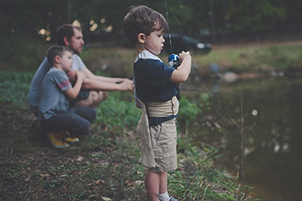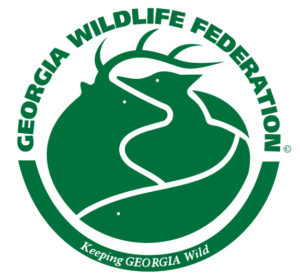Camo Coalition
Sportsmen and women across the state are voicing support for Amendment 1. Will you join Georgia Wildlife Federation, Camo Coalition, Georgia Outdoor News, Georgia Hunting & Fishing Federation, and others by saying YES to Amendment 1 on November 6?

Learn More About Amendment 1
AMENDMENT 1: FREQUENTLY ASKED QUESTIONS
What will I see on the ballot?
The constitutional amendments will be near the end of your ballot. The Georgia Outdoor Stewardship Amendment is Amendment 1 and reads:
Without increasing the current state sales tax rate, shall the Constitution of Georgia be amended so as to create the Georgia Outdoor Stewardship Trust Fund to conserve lands that protect drinking water sources and the water quality of rivers, lakes, and streams; to protect and conserve forests, fish, wildlife habitats, and state and local parks; and to provide opportunities for our children and families to play and enjoy the outdoors, by dedicating, subject to full public disclosure, up to 80 percent of the existing sales tax collected by sporting goods stores to such purposes without increasing the current state sales tax rate? (HR 238, Section 2, Lines 29 – 37)
Voting YES on Amendment 1 will provide a stable source of funding for conservation in Georgia without a tax increase.
What is the enabling legislation for Amendment 1?
The enabling legislation for Amendment 1 is HB 332, the Georgia Outdoor Stewardship Act. If Amendment 1 does not pass, HB 332 will be repealed on January 1, 2019. (HB 332, Section 3, Lines 291 – 297)
The Georgia legislature determined that dedicating a portion of the sales tax collected on goods related to outdoor recreation to conservation would be good for Georgia. With bipartisan support, HB 332 passed with only 1 nay vote in the House and no nay votes in the Senate.
If HB 332 passed, why do we need a constitutional amendment?
By passing a constitutional amendment, Georgia voters will ensure that a minimum of 40% of sales tax from outdoor sporting equipment MUST go into the Georgia Outdoor Stewardship Trust Fund and cannot be absorbed into the general fund (HB 332, Section 1, Lines 83) unless the state enters a major recession (HB 332, Section 1, Lines 86 – 105).
Voting YES on Amendment 1 will ensure that conservation funds will be used as the voters intend and not absorbed into the general budget for other purposes.
Where does the money come from?
The money comes from the sales tax already collected on outdoor recreation equipment. More specifically, the funds are from sales tax collected from establishments under the 2007 North American Industry Classification Code 45110. Examples of 45110 establishments are Cabela’s©, Bass Pro©, and REI©. (HB 332, Section 1, Lines 77 – 82)
Your purchase from sporting goods stores of backpacks, binoculars, fishing tackle, hiking boots, tents, etc. will also fund the stewardship of our state parks, Wildlife Management Areas, and other conservation lands we all enjoy.
Is this a tax increase?
No, this is a NOT a tax increase, new tax, or re-appropriation of funds from another program. It is simply a dedication of taxes already collected on outdoor sporting goods. (HR 238, Section 2, Line 29)
No. This is a NOT a tax increase.
How much money will go into the Georgia Outdoor Stewardship Trust Fund each year?
Between 40% and 80% of sales tax collected on outdoor recreation equipment will go into the Georgia Outdoor Stewardship Trust Fund. (HB 332, Section 1, Line 23 and Line 79).
At the 40% level, an estimated 20 million per year will go into the Trust Fund.
What determines the percentage that goes into the Georgia Outdoor Stewardship Trust Fund each year?
Increases are at the discretion of the Georgia Legislature.
If the Board of Trustees of the Georgia Outdoor Stewardship Trust Fund prove to be good stewards of the funds, the legislature can approve an increase of up to 80% of the sales tax.
Will this funding “take away” from other state priorities?
The General Assembly determined the initial $20 million annual dedication of funds in light of the state’s other budget needs.
It is important to remember that these funds will actually generate additional revenue as they support Georgia’s growing outdoor recreation industry and other job-creating sectors such as film, tourism and agriculture that rely upon land and water.
Are there safeguards in the case of an economic downturn?
If sales tax collections fall a full 1% or more below the year prior, the amount dedicated is reduced by 20%. If that happens again the next year (ie, another 1% or more drop) the amount is reduced by 50%. It stays at the lower amount until the tax collections return to the level they were before they dropped. (HB 238, Section 1, Lines 86 – 105)
Yes, should the state suffer an economic downturn or crisis, the legislation provides a mechanism for the funding to be reduced.
How long will money go into the Georgia Outdoor Stewardship Trust Fund?
The Georgia Outdoor Stewardship Act will automatically be repealed in ten years. However, the repeal date can be extended by the Georgia General Assembly for an additional ten years. (HR 238, Section 1, Lines 18 – 20)
10 years with an option to renew for an additional 10 years.
How would these funds be used?
Money in the Georgia Outdoor Stewardship Trust Fund will be used for the protection of conservation land. (HB 332, Section 1, Lines 26-27). And, more specifically, to provide stewardship for state parks, state lands, and wildlife management areas; support local parks and trails; and protect critical conservation land (HB 332, Lines 29-30).
It doesn’t matter if you like to hike, hunt, kayak, fish, or just want a clean, healthy environment to live in – Amendment 1 benefits all Georgians.
Who decides how the money is spent?
A Board of Trustees for the Georgia Outdoor Stewardship Trust Fund will be established consisting of the following eleven individuals:
- Department of Natural Resources Commissioner
- Department of Transportation Commissioner
- Forestry Commission Director
- Environmental Protection Division Director (non-voting)
- Wildlife Resources Division Director (non-voting)
- Coastal Resources Division Director (non-voting)
- State Parks Division Director (non-voting)
- Four members selected from the private or public sectors of forestry, conservation, hunting, fishing, and/or local government.
HB 332, Section 1, Lines 203 – 221)
How do we know the money is being used appropriately?
Projects will be prioritized and evaluated by the Board of Trustees. Additional project approval is required by the board of the Georgia Department of Natural Resources and chairpersons of the appropriations subcommittees of the House of Representatives and Senate. (HB 332, Section 1, Lines 203 – 224).
With project approval required at three different checkpoints, expenditures from the Trust Fund will be carefully scrutinized. In addition, non-profits like the Georgia Wildlife Federation will be carefully monitoring how funds are being used.
Who can submit a project proposal?
Proposals will be accepted from state agencies, local governments, nonprofit and for-profit organizations, private land trusts, and individuals. (HB 332, Section 1, Lines 232 – 234)
Anyone.
How does the Board of Trustees prioritize project proposals?
Project proposals shall have as its primary purpose the conservation objective to support state or local parks and trails, or to provide stewardship of conservation lands. (HB 332, Section 1, Lines 110 – 253)
Increased priority will be given to projects that
- Have matching funds
- Support hunting, fishing, and wildlife viewing
- Contribute to surface and ground water quality and flow of springs
- Overlap with U.S. Military needs for habitat protection
Project priorities are established but there is flexibility to allow for unforeseen conservation needs at both the state and local level.
Who will determine if the projects are successful?
At the end of each fiscal year, the Georgia Department of Natural Resources must submit an annual report of its activities to the:
- Governor
- Lieutenant Governor
- Speaker of the House of Representatives
- Chairperson of the House Ways and Means Committee
- Chairperson of the Senate Finance Committee
- Chairperson of the House Appropriations Committee
- Chairperson of the Senate Appropriations Committee
- Chairperson of the House Natural Resources and Environment Committee
- Chairperson of the Senate Natural Resources and Environment Committee
(HB 332, Section 1, Lines 193 – 201)
An annual report is available to the General Assembly and therefore available to the public.
